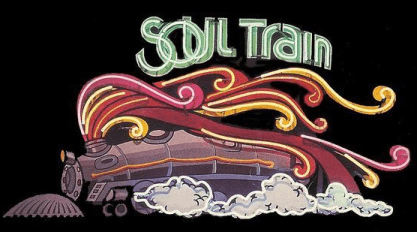Soul Train

"The longest-running first-run nationally-syndicated program in television history."
Soul Train was a music program in the vein of American Bandstand that ran in first-run Syndication from 1971-2006.
Conceived and hosted by Chicago newscaster Don Cornelius, the 60-minute show was both a showcase and a trend setter for black music, fashion and dance for generations of black youth. Along with its signature elements, the Soul Train Scrambleboard (where a man and woman had 60 seconds to arrange letters on a magnetic board to spell out the name of a current celebrity) and the Soul Train Line (where dancers show off their best moves while moving down two columns of fellow dancers), the show is a pop cultural icon to this day. Along the way, it spawned its own record label (Soul Train Records[1]) and its own awards show (which actually survives the show itself).
Don Cornelius hosted from the October 2, 1971 debut through the end of Season 22 (1992-93), after which the show utilized a large variety of guest hosts for the next few years. Mystro Clark became the new permanent host at the beginning of Season 27 (1997-98), but only held the role briefly before Shemar Moore replaced him on the thirteenth show of Season 29 (1999-2000). Dorian Gregory was the final host, holding the reins for the show's last three years (2003-06).
The last first-run episode aired on March 25, 2006, with the broadcasts of December 9, 2006 to December 29, 2007 being repeats of episodes from 1973-88; some of these episodes were shown again starting the following week, with the very last broadcast (September 20, 2008) being the Donna Summer/Staple Singers show from December 15, 1984.
After the sale of Soul Train's rights from Don Cornelius Productions to MadVision Entertainment in early 2009, an official YouTube channel was established along with a planned series of DVD sets from Time-Life. Reruns of early episodes can currently be seen on BET's new Centric channel (formerly BET J/BET on Jazz).
Not to be confused with a train full of souls.
- Captain Ersatz: On The Cosby Show, Theo and Cockroach are jazzed to appear on "Dance Mania" and dance with "Tina" (an Expy of Carol Song).
- Catch Phrase: The show opening, "The hippest trip in America", and the show closing "We wish you love, peace, and...SOOOUL!"
- Cool Old Guy: Don Cornelius, during the show's later years.
- Early Installment Weirdness: Early episodes owed more to Laugh In than American Bandstand in terms of the show's look and camera work. The pilot in particular had a completely different announcer, and the open showed the musical guests (Gladys Knight & The Pips, David Ruffin, and The Honey Cones) were dancing among the "Soul Train Gang" instead of showing short clips of their performances.
- Also, many acts chose to perform live, rather than lip-synch to their record. This was a practice that pretty much died by the late 70s.
- Also also: the Soul Train Line didn't separate into the more familiar men and women's lines until 1982. Up to then, it was "men on the right, women on the left."
- Long Runner: Every weekend for 35 years.
- Revolving Door Casting: Of course, this is endemic to a show that has probably had thousands of dancers over the years. Even Don Cornelius himself was AWOL for the show's final years. However, many of the show's dancers also count as long runners, many continuing to dance on the show for years even after making it big. The most famous example is fan favorite "the Asian Girl with the Long Hair", Cheryl Song, who was a show regular and dancer for the better part of 14 years or almost half the show's run (1976-1990).
- Real Song Theme Tune: Many people think "TSOP (The Sound of Philadelphia)" was written specifically for Soul Train...and actually, it was. In an interview for a VH-1 documentary about the show, Cornelius stated that he hired the Philadelphia-based songwriting team of Gamble and Huff to write a song for the show. He liked it, but he was adamant about not calling the song "Soul Train", so they called it "TSOP" and he approved. Cornelius went on to say that he regretted that move.
- Suspiciously Specific Denial: During the mid-1970s, a rumor began floating around that Cornelius had died of a drug overdose, prompting him to make an announcement at the beginning of a subsequent episode that he had not died of a drug overdose and his attorneys were trying to find whoever had spread that slander. The interesting thing is that while Cornelius had carefully stated he did not die of a drug overdose, he never stated that he hadn't used drugs.
- Now Harsher in Hindsight since Cornelius died in 2012.
"And as always, in parting, we wish you love...peace...and SOOOOOOOUL!"
- ↑ which was re-branded as Solar Records after only two years, when Cornelius dropped out to concentrate on the TV show, though the show and label remained closely tied